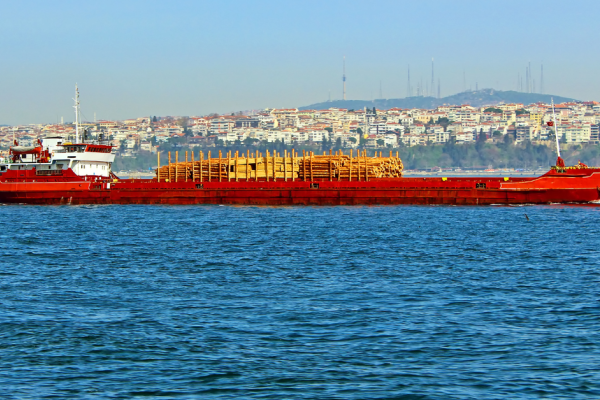
Voirrey Davies
Published: July 31, 2025
The Taikoo Brilliance (Batavia Eximp & Contracting (S) Pte. Ltd. v Pedregal Maritime S.A. [2025] EWHC 1878 (Comm)) dispute arose from an arbitration decision regarding the shipment of pine logs from New Zealand to Kandla, India. The questions before the court were (1) were the claim(s) time barred; and (2) was the cargo properly identified as being carried on deck.
Background
Pedregal Maritime S.A. (the “Owners”) were owners of the vessel Taikoo Brilliance (the “Vessel”) and also the carriers under the bills of lading. Batavia Eximp & Contracting (S) Pte. Ltd (the “Holders”) were the holders of four bills of lading issued by Owners (the “Bills”) in respect of a cargo of New Zealand pine logs. Two of the Bills referred to some of the cargo being carried on deck.
The Vessel arrived in Kandla and the cargo was discharged. However, the Bills were not available and the cargo was discharged against a letter of indemnity provided to the Owners by the charterers. The Holders then alleged misdelivery against Owners.
The Bills contained an arbitration clause for all disputes, however initially no arbitration was commenced. The Holder instead issued a writ in the High Court of Singapore to arrest a sister ship of the Vessel. The arrest went ahead a month later and security was given to allow the sister ship to be released.
The Owners applied to stay the Singapore proceedings, arguing that the arbitration clause should take preference. A stay was granted and this decision was confirmed by the Singapore Court of Appeal on 19 October 2021.
Arbitration was finally commenced by the Holders more than one year after the delivery or alleged misdelivery of the Cargo. The Owners argued that the claim was time barred under Article III (6) of the Hague-Visby Rules which provides:
“…In any event the carrier and the ship shall be discharged from all liability in respect of loss or damage unless suit is brought within one year after delivery of the goods or the date when the goods should have been delivered….”
The arbitrator ruled that the time bar did apply but only for the cargo carried under deck. This is because under-deck cargo is automatically covered by the HVR and therefore the time bar had passed. In contrast deck cargo is generally excluded from the HVR. Since the HVR do not apply the time bar provision doesn’t apply either.
The Appeal
Two questions ended up before the Court.
The first question was whether the Singapore court proceedings had stopped time by being a “suit” as per Article III(6) of the HVR.
The Holders argued it was clear that if an arrest was being sought in Singapore then a substantive claim was inevitable. However, the court formed the view that proceedings for security was not the same as proceedings brought for establishing liability, these were two separate events.
The court determined that “suit” for the purposes of Article III(6) is intended to mean proceedings that can decide the claim. The passage of one year with no action on the merits of the claim “clears the books” for Owners and the time bar had bitten.
The second issue was whether the deck cargo had been properly declared, particularly where the time bar only fell in relation to the under-deck cargo.
The court agreed that the purpose of Article 1(c) was to allow the holder of a bill to identify whether the goods fell within the scope of the Hague-Visby Rules or not. Owner’s position was that this meant the ability “to identify quickly and easily” whether the goods fall within the scope of the Hague-Visby Rules.
The court found that these additional words were, however desirable, adding too much to the Article beyond what was written in it. The court determined that each case involving deck cargo is likely to have its own evidential questions; essentially saying that the requirements to satisfy the Article may vary from case to case.
The final decision was that the provision “which by contract of carriage is stated as being carried on deck and is so carried” leads to two questions, if the answer to both of these is yes then the cargo is properly identified as carried on deck:
- Does the bill state the cargo is carried on deck? And
- Is the cargo then carried on deck?
In the present case, since the arbitrator had concluded the statement on the bills of lading was sufficient the Hague Visby time limit did not apply to the deck cargo.
Conclusion
Whilst best practice may suggest it is desirable to more specifically identify the cargo carried on deck, which provides certainty for both carrier and cargo interest, the court found that even relatively basic declarations of carriage on deck is sufficient to identify that cargo. Parties may wish to be more exacting in their identification to avoid costly arguments about the proper declaration of deck cargo and whether the cargo falls with the Hague-Visby Rules and, for the purposes of Club cover, where excluded from the Hague-Visby definition of “goods” the bills of lading:
- either provide that the carrier:
- is free from all liability for loss of or damage to cargo; or
- with rights, immunities and limitations no less favourable than those contained in the Hague Rules or Hague-Visby Rules; or
- contains an appropriate liberty to carry cargo on deck and provides for the Hague Rules or the Hague-Visby Rules to apply to such cargo.
Regarding time bars it is always important to ensure the underlying contractual documents have been properly reviewed and proceedings have been commenced in the correct forum and jurisdiction.




